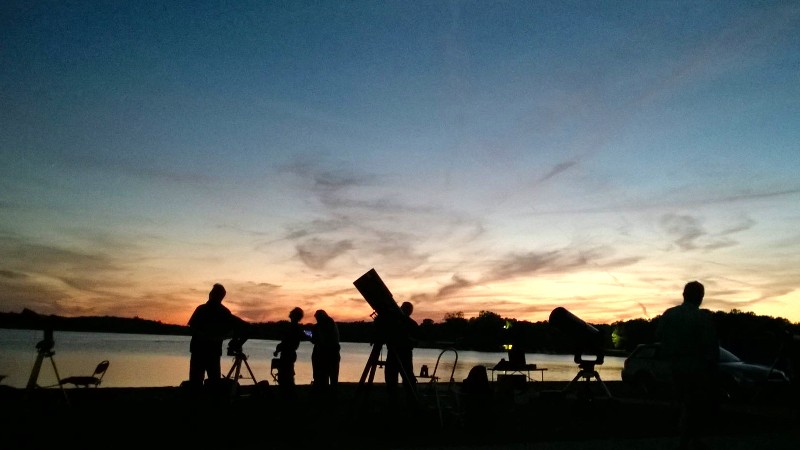Look Up: Astronomy at the Beach returns for first in-person event since 2019—and will create a comet

Astronomy at the Beach (AATB) is an annual two-day event each fall sponsored by the Great Lakes Association of Astronomy Clubs. This year AATB will take place in person after two years as a virtual-only event. It runs September 16 and 17, from 4 pm until midnight each day, at the Island Lake Picnic Grounds inside Island Lake State Recreation Area in Brighton, Michigan.
We asked AATB’s communications volunteer Brian Ottum to give us an overview of the event and what we can expect this year.
Q: What and where is AATB?
A: Astronomy at the Beach is Michigan’s largest free astronomy event. It’s a great opportunity to look through big telescopes, do hands-on science demonstrations, and hear cool presentations. The location is Kent Lake Beach near the Island Lake Picnic Grounds within the Island Lake State Recreation Area near Brighton. We are so happy to be back to an in-person event after two years doing things virtually. It’s much more fun. Our volunteer team of local amateur astronomers has been putting on this event for over 25 years.
Q: Are there events both day and night? What’s the typical turnout?
A: Both Friday, September 16, and Saturday, September 17, have similar schedules. First, telescopes will be set up to safely look straight at the sun’s surface, starting at 4 pm. After 6 pm, there will be vendors, science demonstrations, and local astronomy club tables. Starting at 7 pm Friday and 6 pm Saturday, we’ll have presentations in the tent showing the exciting new Webb telescope images and a keynote speaker who is both a planetary scientist and NASA/JPL Solar System ambassador. Saturn, Jupiter, exploding stars, and galaxies can be seen in the dozens of telescopes starting at 8 pm. We expect a total of 3,000 people across the two-day event.
Q: Why is AATB special and how is it different from other area night sky viewing events such as the Great Lakes Star Gaze?
A: This is a one-of-a-kind event because it is so immersive and interactive. First, we have HUGE telescopes that our volunteers bring to the beach and share with the public. Second, there’s a diversity of activities, from making a comet to learning about your local club to a laser tour of the constellations. Third, we also highlight what is currently happening in space.
Q: Who should attend and are there events specifically for kids?
A: This event is for all ages. Children will enjoy the hands-on science demonstrations. Young people will enjoy the display of space pictures. And older space-lovers will learn new things from our speakers. Everyone loves seeing Saturn’s rings, Jupiter’s storm clouds, stars being born, and galaxies far, far, away.
Q: Can you talk a little about some of the other presentations planned for this year?
A: We’ll be showing and explaining the brand new Webb Space Telescope images, talking about NASA’s new Artemis mission to the moon, and creating a real comet with a tail.
Q: “A real comet with a tail”?
A: Michigan Science Center will be creating the comet, live in front of the audience. Dry ice is a main component and its fog trails behind the comet as it goes around the sun. That’s the tail!
Q: I see the keynote speaker is Nicolle Zellner. What will she be speaking about?
A: We are excited to have such an expert on our solar system. Dr. Zellner is a professor at Albion College who recently won the Carl Sagan Medal for her extensive public outreach. She’ll be speaking at about 8 pm Friday on Michigan’s connection to the Apollo space program. Then about 8 pm on Saturday, she’ll expand our horizons to talk about life in the universe.
Q: What happens if it's rainy or cloudy one or both nights?
A: We have the big top tent where the show will go on no matter what—presentations, astronomy club tables, sponsors. We also have an indoor classroom where I personally will have my display of big space pictures—the Milky Way over a Michigan lake, the Andromeda Galaxy, and the Horsehead Nebula. And near me, there will be some cool, hands-on science demonstrations.
Q: What's your favorite part of AATB?
A: When I walk out of the classroom at twilight, I see dozens of telescopes silhouetted against the orange sky. I can hear the buzz of excited conversations and the anticipation of seeing things they’ve never seen before.
Amy Cantú is a Production Librarian at the Ann Arbor District Library.
Astronomy at the Beach runs September 16 and 17, from 4 pm until midnight each day, at the Island Lake Picnic Grounds inside Island Lake State Recreation Area in Brighton, Michigan.


































